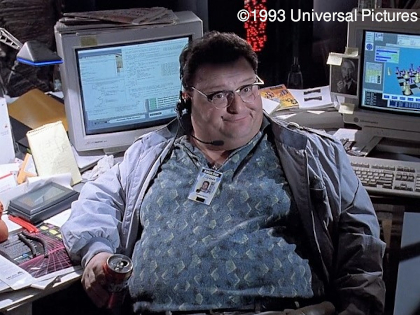
"There's a finite amount of memory, you can't use it for everything!" -Dennis Nedry
Blog
Home Go back.
20th May 2024
All your base are belong to systemd
This post is about how some implementations of systemd will, by default, cause some devices with specific hardware configurations (OverlayFS) to hang. The process is fully automated. I describe how this scenario can hopefully be avoided in the future, through a number of possible (and unconventional) workarounds.
Last week I was made aware of a Raspberry Pi model B1 (kernel v6.1, Raspbian/Debian Bullseye) that became unresponsive, including to ssh. After many login attempts over the course of 24hrs, I was eventually able to see that 100% of the CPU was consistently being used by apt-get check -qq, with almost no available RAM. I thought this may have been a result of the aborted update that was attempted a few days previously, but at the time I'd ran the more typical apt-get update. At that time, the update stalled at about 61%. It looked like two things might be happening: Something else was attempting to run updates, and neither those updates nor my own attempts were finishing as expected. The Pi was configured in overlay (read-only) mode, and I suspected a memory issue.

"There's a finite amount of memory, you can't use it for everything!" -Dennis Nedry
I knew recent Raspbian editions (within the last ten years or so) made use of systemd, but I had no idea just how broad systemd's scope now is. It seems to manage everything, the government has to ask it for bank holidays (OK, maybe not quite yet). The problems I experienced seemed to occur within days of each other, and so (coming from a cron background) I started looking for sub-weekly schedules in /etc/cron.daily. I think the file apt-compat in cron.daily mainly checks to see if /run/systemd/system exists, and exits if it does. If not, it runs through a few power system status checks before invoking /usr/lib/apt/apt.systemd.daily.
As a number of systemd processes exist on this Pi in addition to the one above, I think it's safe to assume systemd will be managing the updates. There are two relevant services, namely:
apt-daily.service ;
apt-daily-upgrade.service .
These both approximately run /usr/lib/apt/apt.systemd.daily (the latter service with the install option), similarly to how cron would in other circumstances. At this point it's probably much easier to simply disable the relevant services, but I wasn't sure if this would persist after restarts—it definitely needs to. My chosen solution was to rename apt.systemd.daily. This should have the added benefit of disabling any/all recursive variations of its use, as the command the above services reference will no longer be found. The process can be re-activated by reverting the name.
It seems that systemd is in this case, checking for/downloading (to RAM, see here), and possibly running updates on a daily basis. This uses bandwidth, and doesn't seem to check if the filesystem is read-only or not (or if there is sufficient RAM). There are some options in apt.systemd.daily to disable checks, updates, and upgrades, so it does provide a certain level of granularity. It is perhaps the correct approach to take, although I decided on the renaming method as it should(!) disable the entire process in a way which is easy to identify without opening the file at a later date. The renaming method also ensures the processes can (almost) never be ran, regardless of the service status post-restart.
On a Pi model B1 (single core 700MHz with <256MB available RAM), automated update checks/downloads/upgrades could severely degrade the performance of this already slow machine. The worst-case scenario is perhaps as I encountered: an almost totally unresponsive system with only sporadic access through ssh. The downside to disabling the update services is that the system will no longer have automated security updates (among others), and it's a decision that can probably only be made on a case-by-case basis. I do have to question where the responsibility lies though: Is it systemd's responsibility to check whether it can write to the required directories first, or is it the user's responsibility to ensure that systemd can perform updates in a satisfactory manner? It should be possible for systemd to switch to non-overlay mode first, carry out the update routines, and then revert back to overlay mode again, although the change would probably involve a system restart. I'd be uneasy with systemd having that level of autonomy being enabled out of the box. If updates are going to be automatically attempted without the OverlayFS check, the outcome (as I discovered) is that the system becomes unresponsive anyway: the (then) unstoppable force of apt.systemd.daily hits the immovable object of OverlayFS (and the fact <256MB of useable RAM exists). In my case, the fallout from this coupled with the ongoing usage of the device corrupted one of the mounted filesystems in use at the time. (This was recoverable, but avoidable: it should not have happened.)
I'd suggest that systemd in this case goes against the Unix philosophy of doing a single task, and doing it well: systemd seems to want to do a wide range of tasks, but without checking whether the conditions for some of the required actions are sane. OverlayFS is a probably niche configuration, but it exists and it's particularly well suited to Raspbarry Pis and other equipment which is often installed and used remotely. systemd has been integrated very deeply into Raspbian and other operating systems, and to find that it hasn't been configured to check for sufficient RAM or OverlayFS before attempting updates is astonishing. At the very least, systemd could have checked whether "/" was mounted as overlay, and exited if so. This means updates wouldn't happen, but it also means systemd doesn't become responsible for hanging the system it was supposed to update. The specification of the output here suggests that a broken, out of date system is preferable to a working, out of date one:
systemd is rapidly achieving godlike status among Linux communities, and I am slightly concerned about the scope of its remit and the attitude some distro maintainers are taking. What I dislike here is not systemd itself, there are a number of examples where it has simplified previously convoluted tasks. My concern relates to the way it's been sloshed all over the Linux world as some kind of magic cure-all.
9th March 2024
Peter Christie died on the evening of the 20th February 2024.

Peter was known in many circles, and I knew him mainly through my volunteer work with the North Devon Maritime Museum. He was the mayor of Bideford on a number of occasions, although he was perhaps most notable for his books on local history (in which are about half a dozen of my own pictures). I became aware of Peter through Discovery Records (his book and record shop in Bideford) in the late 90s/early 2000s, whilst I was still at school. I didn't know him then, but I regularly spoke to one of his employees on the C.B. radio and the record shop became a convenient place to swap equipment. As my interest in history developed (with precisely zero thanks to the National Curriculum) I became aware of the old books, and the owner of the shop itself—an unseen, mythical figure known only as "Pete".
The sheer variety of historic books was something I had previously associated only with museums and archives, and the fact that these were available to own physically (albeit at prices I could rarely afford) inspired me to pursue my interest in history. Had I not seen them for myself, I would have scarcely believed the nature of some of the documents transiting the shop: Weekly Intelligence Reports of the Royal Navy (marked SECRET), and confidential technical reports of captured Luftwaffe aircraft are just two examples.
Later on, I realised shops like Pete's were a dying breed, and I managed to get some useful (if a little blurry) pictures of the shop inside and out. Pete (or Peter) later used these in two of his books ("Illustrations of Old Bideford", vols. 10:36, 13:34) which was proof, were any needed, that the photographic recording of places whilst still in use is not a waste of time. This was how I got to know Peter, and as my photography continued I let Peter have copies which he used in a number of volumes of his "Illustrations of Old Bideford" series of books. Aside from this I rarely had any contact with Peter, the notion that he was welcome to use any/all of my pictures was a given. Informal conversations with Pete at the various museum AGMs were interesting. He once recalled experiences of computers being programmed by punched cards, a technology with which the type species of the mechanical computer has become synonymous. I was struck by his sense of being in the present at all times, he was not the sentimental type. This attitude was unwavering; his last email to me on 3rd February 2024 (a reply, in relation to his health) was to the effect that nothing more could be done, and that was that.
SUCCESS in the I.T. aisle!!1one
My ventures into the world of information technology rarely result in a successful outcome for anyone or anything. When a positive outcome occurs, it's worth noting! The National Cyber Security Centre has recently awarded me an NCSC Challenge Coin, after I responsibly informed the UK government of a problem I found with one of its services. My coin depicts Ada Lovelace, who wrote a programme for one of Charles Babbage's computing engines.

The presentation event was an interesting opportunity to meet other researchers, and members of the NCSC and allied departments. Thanks to the NCSC for deeming my report worthy of their attention. Also thanks to the folks over at hackerone for providing a useful interface through which the problems can be presented to the relevant organisation, and for my T-shirt!
> More information on the NCSC Vulnerability Reporting Service (and the coins) can be found here.
> Information on the event itself can be found here.
> Information on reporting problems with UK government domains can be found here.
13th February 2024
The old laptop has burned the install media for the new one, a tradition of sorts. It's as if a part of the old laptop will live on... As it's the same model as its successor it probably will, its few remaining functional spare parts being reused in time.
The BBC's Steve Wright has died. He joins the likes of Terry Wogan and Paul O'Grady, who, in the views of some, created the golden age of BBC Radio 2. I'd think it fitting if the BBC make a version of the Steve Wright in the Af-ter-noooon! jingle to say Steve Wright in the aft-er-liiiife instead. Steve made use of a lot of different effects and jingles, and I don't think it would be inappropriate. It could be used (in addition to the originals) for any re-broadcasts of his programmes, when Radio 2 actually runs out of presenters. Serious Dyin'! (No G)
The BBC are calling time on the iPlayer web PC/Mac download service. It will continue in app form (gosh, I never predicted that last year), so using iPlayer outside the tabletspaceTM will mean running the app inside an emulator of some kind. The reasons given for stopping Web PC/Mac iPlayer include a "low number of people using it" (previous BBC link), although they've not actually disclosed how many people do use it. A report (mirrored here) by Ofcom suggests digital TV consumption is actually increasing, and this is echoed by another contradictory BBC article on the subject. As with everything though, the devil is in the detail and without iPlayer stats we can't know for sure exactly what form of digital the respective claims refer to. I can't help thinking the removal of Web PC/Mac iPlayer is going to be a mistake which will only reduce the reach of the BBC even further, but the BBC seem to be good at doing exactly that. It's going to be interesting to see how App iPlayer maintains compliance parity in the long term with the law allowing time-shifting, and what the BBC's definition of the term may at some point be reduced to. My understanding is the law doesn't require the BBC to provide facilities for time-shifting, but that it can't bring legal proceedings against someone who decides to exercise the right to time-shift (assuming they have a technical means of doing so). I suspect one reason for the cessation will be an attempt to further reduce the threat landscape for what the BBC see as copyright infringement by users of the Web PC/Mac platform. Whether this will have any effect remains to be seen.
The BBC News web editors have started 2024 as they mean to go on, with some interesting editorial choices. First, a reassuring (and since clarified) fact about the UK's weather records (2/1/24):
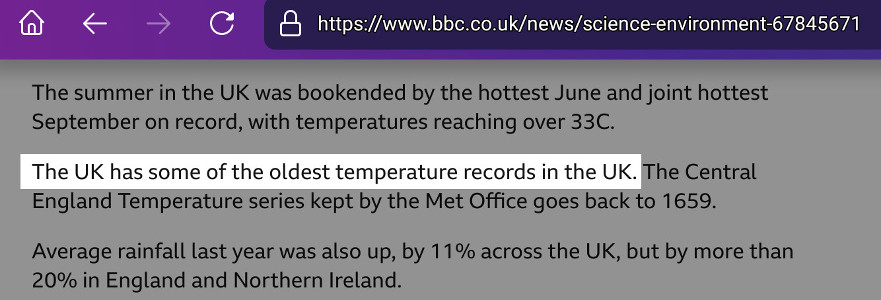
Above: The UK has some of the oldest temperature records in the UK... good to know!
But wait! There's more! BBC English is becoming more progressive with the following use of a radical new plural for the word "aircraft". The word used here is in the context of more than one aircraft (plural), not possessive (which would have been "aircraft's"):

Above: The plural of aircraft is obviously (not) aircrafts.
Unfortunately this isn't an isolated incident. Here're some more aircrafts:

Above: More aircrafts!
And for reference, the plural for the word as understood by Merriam-Webster. Quite what they mean by the word airplane below it is anyone's guess...:
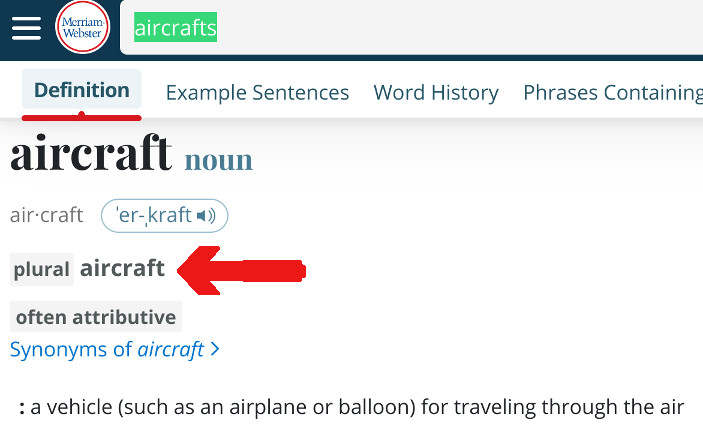
Above: Definitely just aircraft. Indicated by the Red Arrow (sorry).
Another article describes a factory that was supposed to produce electric vans, buses, and... taxes. That's right. No taxis here, just taxes:

Above: I'd like to hire a tax, please..
I get the impression with these articles that the errors happen as a result of the wrong word, as opposed to a misspelled one which would have been corrected (although that doesn't explain multiple aircrafts). It suggests the writers maybe don't have as firm a grasp of English as their counterparts did 50 years ago, or that they just don't bother proofreading. It's also possible these errors are a result of speech-to-text dictation. Either way it shows that the BBC, once held as a type example of the English language, is no longer putting the quality of its written articles on the same footing as it once did. I'll mention here that the standard my own written English is not ideal, but there's a difference: I don't get paid to write news articles for one of the world's most trusted news sources.
It may come as no surprise that Ofcom are seeking greater control over the content of the BBC News website. If it forces the BBC to sort out their spelling/grammar/language and factual accuracy it can only be a good thing.
14th December 2023
The Bideford and Torridge edition of the North Devon Journal has been renamed the North Devon and Torridge edition, and it happened with the edition dated Thursday 7th december, see below:
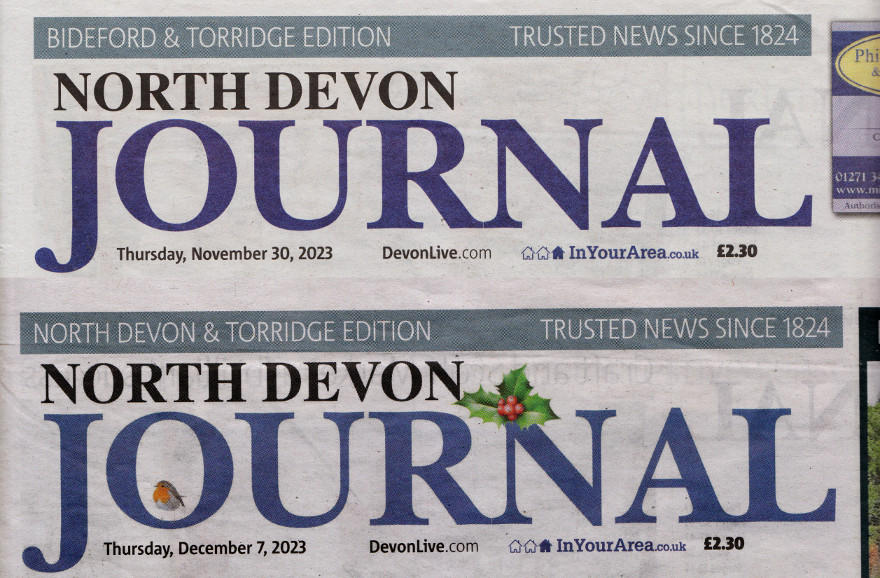
Above: Comparison between recently renamed editions.
I suppose the reason for this is due to the changing nature of news consumption, with most of it probably spreading via social media in near real-time. Like the classified ad sections of local newspapers, the content has moved to the internet. In my opinion truly Bideford-centric news was getting less and less publicity, so unless their journalists were somehow hugely inefficient compared to other regions in some ways it makes sense to widen the net. The cost of physical newspaper distribution probably isn't getting any cheaper, and this is no doubt reflected in the semi-regular price increases the Journal has chosen to make over time. I still think Bideford generates enough newsworthy content, if only the editors would see fit to publish it.
I'm not sure if Lenovo have lowered the build quality standards of their Thinkpad keyboards post-takeover of IBM's PC division, but personal experience suggests they may have. Whilst I have a replacement keyboard, I've decided to see how just many keys I can live without before everyday computing tasks become impossible to the point of using a USB keyboard instead (or just replacing the integral one). I've documented the CTRL key issue here, and so far the following keys are non-functional:
2, w, s, x;
both CTRL keys;
RIGHT arrow key.
Interestingly, the 2, w, s, and x keys start working when the laptop has warmed up after about an hour. Of all the laptops I've owned, the IBM/Lenovo machines are the only ones to have had key failures (albeit after many years). The first being the Backroom's Thinkpad 360, followed by a T410, both of equally unknown history.
How the BBC and Ofcom are directing the death of AM (and, eventually, all Analogue broadcast radio), along with radio teleswitches:
This looks at the recent BBC intentions to stop future longwave analogue broadcasting in the UK, and explain why some of the facts they quote, whilst true, are not particularly relevant to the cause they want to publicise- their desire to cease broadcasting (to the UK at least) on 198kHz. Granted, longwave broadcasting is a very good way of burning cash, and the BBC are faced with needing to make the licence fee go further. If you've listened to BBC radio 4 on 198kHz over the years you'll probably have heard them comment on how they won't be there for much longer because [insert reason]. Rumours of longwave's imminent demise have been doing the rounds for a long time. This post doesn't relate to the various BBC World Service offerings as they're sometimes funded separately (often through grants funded by the Foreign, Commonwealth and Development Office, more info on that here). Here's a particularly oft-quoted AM factoid, with an explanation of why it doesn't make much sense:
> The BBC don't own the AM transmitter sites.
This is true. They're owned by a company called Arqiva (because at some point in history somebody in government decided the Beeb had to sell off the transmitting infrastructure and rent it back again). Arqiva also own most (if not all) of the FM/DAB transmitters and transmitter sites. By the BBC's own logic, then, they should also stop transmitting on DAB because they don't own the DAB transmitters either! Hmmm.
It's probably a result of the AM listener base becoming thinner on the ground, and (unlike web-based distribution), difficult to quantify. It's a reasonable direction to want to take, but the reasons being given to listeners reflect the continual dumbing-down of attitudes toward audiences by the Beeb ("we're running out of valves" is another reason). I don't think any of these soundbites really explain the reality behind the Beeb's intentions, which are more or less in line with massive changes in the works by Ofcom (the communications regulator), in the name of the draft Media Bill. This is quite a substantial document and I haven't read all of it yet, but there are some interesting parts that are worth an in-depth look in a future post. Initially, some points of interest lie in Part 5 (regulation of radio services), namely 318 (2). This amends s85 of the Communications Act 1993, and in doing so removes Ofcom's duty to provide diversity of content.
The AM 198kHz switch-off will also affect radio teleswitches (like Economy 7 electricity meters), and the word from Ofgem is that it's going to happen at some point in 2024. Could this be a veiled suggestion of the date for the BBC 198kHz switch off? I'm not aware of any firm date quoted by the Beeb for killing Radio 4 longwave, although it's probably about time they made their mind up. The proposed solution is for smart meters to pick up where Economy 7 teleswitching left off, and the fact the teleswitch system has lasted so long is a real credit to the people who designed it.
30th October 2023
This is just a quick update with a rough how-to about cleaning up size scales in photographs, it can be downloaded here. There are lots of ways to process artefact photographs, and a lot will depend on the workflow and what needs to be done. In most cases it's probably fine to use whatever scale you have in the photography setup, and this will be a definitive scale/measuring source. With some artefacts it isn't always easy or practical to include a clear indication of scale, and in such instances these scales can be added digitally from known reference points. I sometimes find it useful to completely re-do the scale just to make it look better, and a nice scale can complement an artefact. As with everything relating to scale though, accuracy is key.
3rd July 2023
It looks like coloured milk bottle lids are finally on the way out. Getting rid of the red/green/blue lids in favour of a single colour (clear-white) will probably make the recycling process much easier. I doubt it's because someone accidentally loaded three tonnes of red lids into the green lid silo... Some recent lid observations are here.
I'm currently working on artefact databases, and I'll add some posts about this to the 'blog when I get more time. It's a deep subject, and one that really needs an entry to itself.
The app-iffication of the internet.
This is a bit of an off-topic post, but it's on a subject I think is worth mentioning because it has potentially severe ramifications for the digital archivist: apps.
There seems to be a trend of late amongst content providers encouraging users to download apps in order to view what was, previously, generic web content available to the (relatively) anonymous internet user. The old popup trend from the 90's seems to be back again, not just the convoluted cookie settings one, but one suggesting the site's content is somehow better when viewed on the relevant app. This presents issues on a number of levels: In a non-mandatory setting, it creates a hindrance to viewing the content on offer as you have to clear both the cookie popup and the app one (and maybe the Sign Up for FREE Updates HERE! one). In an enforced situation, it both restricts access to the content and discriminates against those who either aren't able to use apps on their device or simply don't want to. Some people don't have Google Play/Apple/Microsoft accounts. The requirement to use the relevant apps automatically (though with exceptions) requires giving personal details to these third parties (the app market/identity provider owners) in order to view content (via the App) that has no relation to them. Consider for a moment the thought of having to register your details with a book publisher in order to read a book they publish. Extend this detail exchange to every publisher of every book you ever want to read. There is a third aspect to consider, and this is perhaps the most sinister: data collection. Going back to the book analogy, the publishers would also be able to see all the other books you own, who wrote/published them, and work out what sort of person you may or may not be, for whatever reason they (or the government in their country of operation) choose. They could also revoke your ability to read their book content at any time, and the data you provide (willingly, as per Book EULA) might escape their control at any time. By requiring an app to view content and/or use basic (by today's standards) web services, the content provider/app manager suddenly has access to a lot more data about users than would be possible to scrape from web viewer statistics alone. Compare the following data set scenarios:
Stats from a web browser (which can be falsified, but that's not the issue here):
Browser name, version, compatibility, operating system name, type, character sets, architecture, plugins, etc.
Stats/features potentially available to an App:
Device name, type, version, RAM, connectivity (bluetooth, IRDA, etc), location, uptime, screen dumps, contacts, access to CPU resources (x-coin mining while you sleep?), login details (email, username, phone number), consent to monetise this information as per app EULA, etc.
Some of these stats might not be available in all cases, and some most likely are controllable by the end user. The point is, the web was designed in a way that specifically avoided the restriction of content that app culture now seeks to normalise. The desire to use an app to view content also demands, in return, continued, real-time trust in the provider of that app. Whilst this may be innocent enough, it's quite possibly far beyond the level of trust needed to browse web content organically. Trust is a good thing, but it's also a risk. By not requiring trust, there is no trust to lose. By extension, there's also the possibility that the non-app content/service functionality will be intentionally degraded in order to provide incentive to make the app buy-in. A good example here is Microsoft Teams. Opening a Teams link on an Android device will redirect you to a page informing you that Teams on Android requires the official app. Activating Desktop Mode on the device however opens the Teams web-based login (as of 03/2023), from where it's possible to join the meeting in the usual way. Already, this violates the trust put in the service provider by the user. Here, Microsoft made a choice to deceive the tablet user into providing their details to a third party (in this case, Google) and download the app (which possibly requires even more personal data to be disclosed to Microsoft) before being given the functionality available with just a few alternative technical steps to the process. I'll put this another way: Microsoft lies to its users in order to force uptake of their apps. Is this acceptable? I don't think it is. Are they unique in this respect? I doubt it.
Here are some examples of App/Data walls becoming more commonplace on the internet, starting with Quora.com:
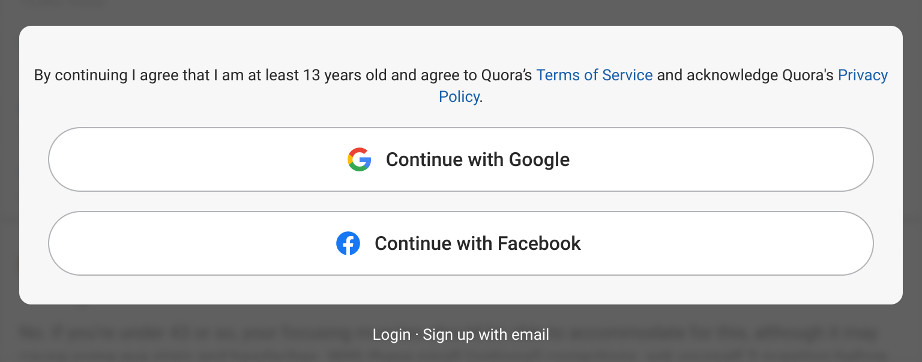
Quora registration wall. (quora.com).
Notice Quora suggests you can log in to view content using Facebook or Google. That's definitely one way of outsourcing data retention and its associated risks. Users can log in with something called email, but this option is significantly less pronounced. It's right at the bottom of the box, in smaller text. At the time of writing, it is (ironically) possible to use Quora without registration, for a short time. By so doing, the age verification confirmation is also avoided. This suggests to me the age verification is merely used to add moral value to the otherwise unnecessary viewer registration wall. Here's another example:

BBC Registration nag screen. (news.bbc.co.uk).
The BBC are gradually going down the soft-registration route for an increasing range of the ancillary content they provide. Much of this isn't actually created by the Beeb but outsourced to other companies, meaning there are nearly always additional licensing conditions in place and these are likely to be restrictive. There are a number of reasons for this, but the effect is the same: They require the Trust I outlined above, in exchange for Content. Some would say this is merely re-levelling the balance between consumer and creator, and they might be right. What's at stake though, is the fundamental concept of open access to information. The modern internet is slowly returning to the closed garden of 1990's AOL.
So how will this affect archiving, and where will archivists fit in?
A lot, and somewhere between FacebookMeta, Google/Alphabet, Yahoo!/Verizon, Amazon, and the others.
I mentioned in the site intro the concept of the Digital Dark Age, an era when early digital storage was expensive, and limited. It's possible Web 3.0 meets the same fate, not because of storage but because of access restriction. The complex arrangements between content creators/managers requires them to be just as keen to restrict access as they are to provide it. Some of this is contractually neccessary, whilst in other areas it's arguably not. Accessing Content (and archiving it) on the traditional (pseudo)anonymous basis, is, I predict, going to become more and more difficult for the reasons I've outlined. I think it's also probably got something to do with critical mass, because if enough consumers buy in to the registration/app concept (and it is buying in, with their data), the incentive to maintain unrestricted access will not only be negligible in the early instance, but eventually negative. Compare this with the redesign efforts of major websites to be touch-friendly (ooer!), and the eventual removal of their traditional, non-touch sites. Running two website versions, two different content management systems etc, will not be the most efficient use of resources (or funds). There's also the possibility the non-app content will be seen as a threat, in that the free access browser version will be giving away content that the app version sells (for your data). Archiving app content will require a change of tack, perhaps in a similar way that archiving Flash content did albeit in near real-time. Maybe a Universal Virtual Machine will be created, being able to run apps in both a massively parallel and massively transparent way.
The web could eventually assume the role of a mere carrier, and its actual native content will consist of, and be used by, a few niche operators and their maintainers.
13th February 2023
It looks like the beverage previously known as Lilt has been renamed Fanta Pineapple and Grapefruit, so this is probably the last year that originally marked Lilt containers will be seen (in the UK at least). It joins a long list of disused brands including Opal Fruits, and Choco Krispies (which lasted only a very short time before reverting to Coco Pops), to name a few. The focus on food and drink here isn't intentional, it's just that these play a large part in our culture. The subject needs to be reflected accordingly in the historical record, so it's why nearly every other post in the blog relates to food and drink. The FATCat is also similarly but unintentionally weighted to this end.
It would be nice to have a directory of supermarket single-use carrier bag designs. I have a few bags, but getting around to scanning them is something I haven't done as I've enough to do at the moment.
The OCR project is moving along slowly, I have managed to scan and create a useable pdf with OCR'd text. It's not at all simple, and the OCR engine isn't perfect so it makes mistakes if the text isn't perfectly clear. This is reasonable, but not ideal considering the convoluted workflow involved in creating the documents from start to finish. I will need to develop a more straightforward system if I'm going to stand a chance of scanning any of the books in the library to date. I have a feeling some scanning software includes an OCR facility, but I've yet to find settings that are a reasonable compromise between picture quality and file size. The project's Canon all-in-one office machine will produce very small file sizes, at the cost of quality. For some document types this isn't an issue, but for some of the older books the beauty of the printing, texture, and detail would be missing. The Canon also requires the pages to be flat, which isn't always possible with books (especially old ones).
Another design change which may or may not become apparent later this year relates to the Deposit Return Scheme due to be introduced in Scotland. If this goes ahead (and it might not), there could be design changes which include information relating to the returns and reimbursement process.
25th October 2022
It's been a while, and time doesn't seem to be getting any slower. I'm considering the possibility of using Youtube as a delivery system for the Backroom's multimedia sources. I don't know if this is allowed by the Youtube ToS, but I don't see why the files can't be uploaded there anyway. They'll need to be downloadable, ideally. I'll have the references on the usual pages, but the links will direct to the relevant Youtube URL.
The FATCat page has yet to take account of the recent changes in the food industry: Carr's Biscuits (owned by the usual conglomeration of holding companies) had for a while stopped using the logo of the City of Carlisle on their packaging. They switched over to a similar looking generic logo, which may or may not have changed back again by the time I've written this (their website indicates so). The nationwide shortage of Scampi Fries is still affecting retailers. The price has also increased, and these rises seem to be a hallmark of the times. The Seabrooks multipack crisps now come in two types: the traditional 6-pack and a new 5-pack. Most supermarket packet soups still list the quantity as four sachets (down from five), how long before they drop down to three? Interestingly though, Pot Noodles are still around the 70p point, exactly what I recall them being in the late 90's (aside from the taste).
A while ago I received in the post an instruction manual for a Toshiba V-231UK video machine (a model I've never owned). It's been added to the pile of things to scan in when time permits.
26th March 2022
It seems that my local Poundstretcher isn't the only branch having a Massive Stock Clearance, others are too. It's ironic, and a very old retail trick. The whole purpose of a shop is to clear stock in return for cash. That's how retail works, a stock clearance event happens every time they open. A quick recce yesterday saw many prices increased considerably, with the proviso of there being 50% off everything. To use an example, Seabrooks crisp multipacks were priced at about £1.79... for a five pack. That's right. Working this out, (1.79/2)/5= 0.179p/bag. The six packs are available in Morrisons for £1.10, equating to (1.10/6) 0.183p/bag. A marginal saving for the Poundstretcher customer, assuming I remembered the price correctly. I neglected to find out if the bag sizes were the same, and whilst I would expect this to be the case I'd also expect the six packs to be the standard across the board. Perhaps then, the most interesting thing out of all of this is that Seabrooks have two multipack lines, one for five packs, and another for six. A glimpse of things to come? First a reduction to 25g bags, now shrinkflating the bag count down to five? We'll see if/when it happens.
25th March 2022
Well... Things are going on in the world, and not for the better. Closer to home, something is happening at my local Poundstretcher. Is it another closure? They witnessed the closure of Woolworths on the other side of the high street, and now it looks like it's their turn (spoiler: it isn't). For a long time after Woolworths closed, there was a small stack of Woolworths brand DVD players and other items behind the counter at Poundstretcher. The web page listing for the Bideford Poundstretcher (store 75?) returns back to the store finder page after briefly displaying the map location of the Bideford shop. They have an advert for 50% off in the front window, I might go and have a look. It's a chance to get probably my last multi-pack of Happy Snax, I don't know anywhere else these can be found. I also need to scan this new design to appear alongside the old one on the FATCat page. I'd like to get some pictures of the shop, although trying to explain why is never straightforward (especially to someone who's probably about to lose their job).
Whilst lamenting the escape of Poundland from the Atlantic Village/Affinity retail outlet near the A30 junction some time ago, I once thought Poundstretcher on the high street would make a good location for it. Since, Poundland have strayed further from their once famous tagline of "Everything's a Pound!", to becoming painfully distant from those glory days of crazily cheap products. 35mm film has gone (OK, I understand, nobody used it and it wasn't the best either), £1 power banks are no more, and the £1 USB computer mice have all gone too. They weren't particularly good but they worked, and the beauty of the £1 electronics price point was its ability to reduce the severity a technical problem until a better solution could be found. The £1 power banks worked adequately, and were very hackable: A single 18650 battery, charge/discharge circuit, power cable, and a sturdy case which was available in a variety of colours.
How often have you seen a spelling mistake on a product from a well known supermarket? I found this quite by accident, whilst conducting my own assessment of Morrisons' Scottish Mature Cheddar and Onion crisps:
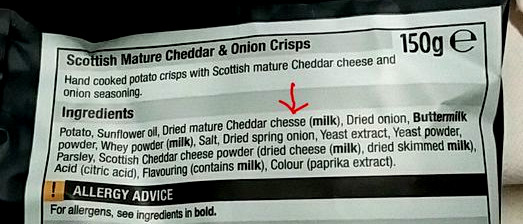
Chesse, the new miracle cheese.
The crisps themselves were acceptable, pleasantly lacking the overt sweetness of those I associate from the likes of ASDA (although, they're probably made by the same manufacturer). It seems Morrisons are keen to get back to making savoury flavours savoury again. In my experience the premium label crisps all seemed to have a generic sugar undertone which somewhat ruined any impression of the flavour being attempted. Tesco are also making progress, their Finest Roast Beef and Horseradish (crinkle cut!) crisps have a very hot horseradish/mustard flavour. I seem to remember these being released around Christmas time some years ago, is this the time when new flavours are trialled? Perhaps the exclusivity of a limited run at this time would help offset the costs of a new flavour, and associated unpredictable demand. It's certainly worked, in my opinion anyway.
08th July 2021
I'm in the process of writing some more guides for the KIG workshop. It's all very well having equipment that A) breaks, B) gets fixed, but the documentation process involves stopping what I'm doing and trying to get good pictures of every step. Not ideal, when I want to get on with the job and get it done. One good thing about fixing something well is that it (hopefully) won't break again for a few years. This week's repair was a transformer replacement on a DBX120XP subharmonic synthesizer. I'd not worked on transformer replacements before and getting my head around +/- rails took some thinking, coming from a largely DC-orientated experience base.
20th June 2021
Some time last year (or this year) I made a dump of all the UK government public info about COVID-19, but it's far too big to upload to this site. I'm not quite sure where I put the file, and it is very comprehensive indeed. Up to that date, it had everything the government released about COVID-19 for public consumption. All the posters, all the radio jingles, all the media and in almost every language. It should all be crown copyright, meaning safe for distribution. I'll probably make a torrent for it, although I won't be able to upload that here either. What I might do is create the torrent, upload it somewhere, and publish the (text, data, whatever) on the COVID sources page. Ideally I'd have merged several updates over time and sorted the contents into media type, date, etc., but I've neither the time nor the resources to do that. What's important is that at least some of the information has been saved.
7th May 2021
The scanning tasks are starting to pile up, literally. There is a collection of "The Cornishman" newspapers from the early 1960's which I intend to digitise one day and make available when the c*pyright expires. These are, technically, already available to view through the British Newspaper Archive. This isn't ideal though, as it requires a connection to the Archive through which the media is streamed. Not very useful if you're on a desert island (or plan to be). A DjVu/pdf format would be ideal, so they can be viewed off-grid. There are also some recently re-discovered boxes of QST magazine from the American Radio Relay League which date from a similar time. As they are bound, these will probably require a dedicated book scanner as I don't really want to destroy them.
There is an increasing amount of third-party digital media in the pipeline, and this raises questions about co-hosting rights. I'm not sure if I'm allowed to co-host documents which are already (or currently) available elsewhere. It's all very well them being downloadable from their original site today, but one day they might not be. British archivists may be familiar with the British government's penchant for stealth-deletion of links to public information. Whilst Crown C*pyright documents present no issues, those produced by private entities vary. Some people don't like the fact you want to co-host their documents, even though they're already available elsewhere and the co-hosting itself actually helps to propagate the information. Some people think archivists are just weird.
8th April 2021
According to the information from the Pot Noodle comparison here, today's Pot Noodles contain 1.9g of salt, whereas the ones from the 90's contain 1.8g of sodium (per 100g).
There are some more crisp packets still to add, but the pictures aren't very good so I haven't added them. It's hard to get good pictures of old crisp packets. So far, the manufacturers include Dells Crisps (Snack Sales), Richmond's Crisps (CSA Enterprises Ltd), Nik Naks (Golden Wonder) and Perry's Crisps (Perri Crisps and Snacks, Tremosna, Czech Republic. Now Intersnack).
2nd March 2021
So, what referencing system should this website use? Some of the information on here should probably have a seperate reference list (in addition to any in-text links), but I'm still trying to decide which system to use. I'm used to using a Harvard-style system, and I think it works OK in texts where most references are for authors. I think it looks strange on a website though, especially if the sources aren't names of individuals in the traditional sense. The website also has the advantage clickability, which provides a whole range of complicated linking options (and errors!). The Vancouver system seems much more streamlined though, and I like the idea of things being condensed down to a simple number. The reference list is also compiled in order of appearance, making it easier to find references that may otherwise get lost in an alphabetical (Harvard-style) listing.
It still doesn't help cite something from the Wayback Machine though. This is difficult, because a site from the wayback machine is within the machine itself. Here is a website that explains one way of doing this.
9th February 2021
We've probably all seen pictures with annoying watermarks, like this:
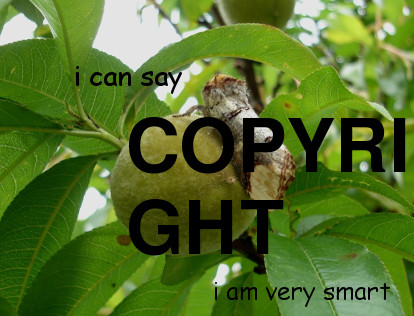
AB12-01 Picture ruined by watermark.
This picture isn't really much use. Some people could probably tell it's a picture of a buff-tip moth (Phalera bucephala). The point is, Adding obtuse watermarks to pictures can make it harder to actually see what the picture is of, and the purpose of an archive or library is to enable research. Watermarks can disuade theft because it'd take time to remove (assuming one has the skill required to do so), but if that's an issue then why not just upload a smaller version as I have with the Backroom archive? This way, I save space on the website, the pictures aren't really good enough to use commercially (I will probably be proven wrong at some point), and they're still good enough to use for basic reference/study purposes.
Is it possible to use watermarks creatively to aid study? I think so, by including a reference number and other information like this:
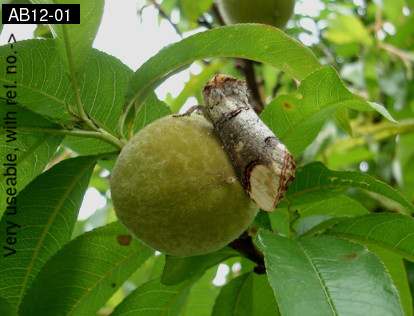
AB12-01 Picture with reference number and other info.
This style has a reference number so it can be found again, and also (in most other cases) a website address. It can be downloaded to the researcher's computer and saved with all their other research. They'll be able to see the picture, they'll know where they found it and they'll know what reference number to quote if they want a better version.
Home Go back.